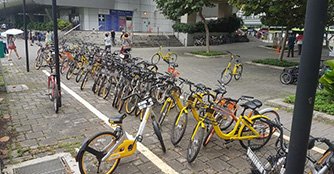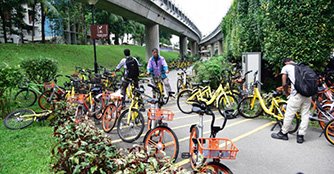New private premises must offer bicycle parking
09 May 2018|2,394 views
In another push towards a car-lite society and to encourage people to use a bike for commuting, the Government will now require all new private developments to provide bicycle parking spaces. For instance, residential developments will generally need to have one bicycle parking space for every four or six units, depending on the zone the property is built in.
Other property types will also have to provide bike parking, such as commercial developments, hotels, industrial developments such as business parks and factories, healthcare facilities, community centres, places of worship, sports and recreation complexes and foreign worker dormitories. The new rule applies to buildings being redeveloped as well.
The Urban Redevelopment Authority (URA) said in a circular, "It is important for developments to provide sufficient and well-maintained bicycle parking spaces in order to facilitate more people to take up cycling as a commuting mode and to minimise indiscriminate parking in public places."
Besides property type, bicycle parking requirements will also depend on the Land Transport Authority's zoning categories. Developments in Zone 1 (spanning the Central Business District restricted zone and Marina Bay) and Zone 2 (outside Zone 1 and within a 400m radius from train stations) will generally need more bicycle parking spaces than those in Zone 3 (outside Zone 1 and 2).
Bicycle parking spaces provided under the new requirements - and any surplus bike parking space that is reasonable - will not be counted towards the maximum allowable land space, or Gross Floor Area (GFA), that can be used for development on the land plot.
URA also reminded developers to locate bike parking in convenient places. Developers, which provide "end-of-trip" facilities - such as showers and lockers - can also get a GFA exemption, unless they are residential developments.
Mr. Nicholas Mak, ZACD Group's Executive Director, said, "Developers may incur some additional costs, but with the rising popularity of cycling in some suburban areas, it may actually be a selling feature instead. Bicycle parking can be stacked up and may not take up as much space."
Dr. Paul Barter, an adjunct associate professor at the Lee Kuan Yew School of Public Policy, said requiring developers to provide bicycle parking is a better idea than requiring car parking, which could be left to market forces. He noted that bicycle parking takes up very little space but is often neglected by developers. "Unless we nudge developers to provide bicycle parking, they may not be providing enough. So, the new provisions are a good move," he added.
In another push towards a car-lite society and to encourage people to use a bike for commuting, the Government will now require all new private developments to provide bicycle parking spaces. For instance, residential developments will generally need to have one bicycle parking space for every four or six units, depending on the zone the property is built in.
Other property types will also have to provide bike parking, such as commercial developments, hotels, industrial developments such as business parks and factories, healthcare facilities, community centres, places of worship, sports and recreation complexes and foreign worker dormitories. The new rule applies to buildings being redeveloped as well.
The Urban Redevelopment Authority (URA) said in a circular, "It is important for developments to provide sufficient and well-maintained bicycle parking spaces in order to facilitate more people to take up cycling as a commuting mode and to minimise indiscriminate parking in public places."
Besides property type, bicycle parking requirements will also depend on the Land Transport Authority's zoning categories. Developments in Zone 1 (spanning the Central Business District restricted zone and Marina Bay) and Zone 2 (outside Zone 1 and within a 400m radius from train stations) will generally need more bicycle parking spaces than those in Zone 3 (outside Zone 1 and 2).
Bicycle parking spaces provided under the new requirements - and any surplus bike parking space that is reasonable - will not be counted towards the maximum allowable land space, or Gross Floor Area (GFA), that can be used for development on the land plot.
URA also reminded developers to locate bike parking in convenient places. Developers, which provide "end-of-trip" facilities - such as showers and lockers - can also get a GFA exemption, unless they are residential developments.
Mr. Nicholas Mak, ZACD Group's Executive Director, said, "Developers may incur some additional costs, but with the rising popularity of cycling in some suburban areas, it may actually be a selling feature instead. Bicycle parking can be stacked up and may not take up as much space."
Dr. Paul Barter, an adjunct associate professor at the Lee Kuan Yew School of Public Policy, said requiring developers to provide bicycle parking is a better idea than requiring car parking, which could be left to market forces. He noted that bicycle parking takes up very little space but is often neglected by developers. "Unless we nudge developers to provide bicycle parking, they may not be providing enough. So, the new provisions are a good move," he added.
Latest COE Prices
April 2025 | 2nd BIDDING
NEXT TENDER: 07 May 2025
CAT A$99,500
CAT B$117,003
CAT C$65,001
CAT E$118,001
View Full Results Thank You For Your Subscription.





















